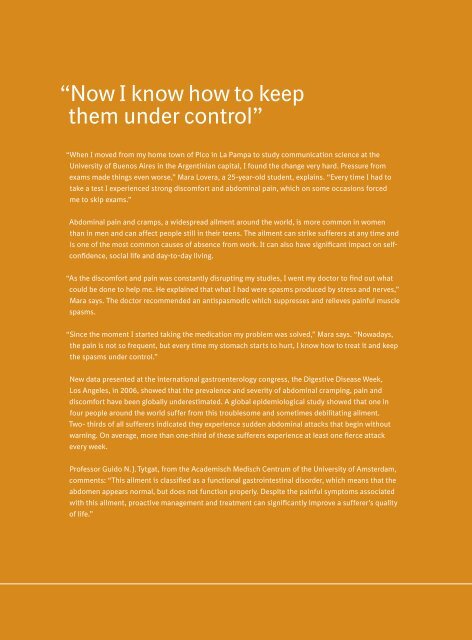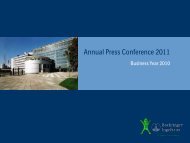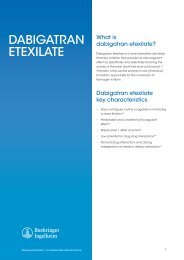Annual Report 2006 - Boehringer Ingelheim
Annual Report 2006 - Boehringer Ingelheim
Annual Report 2006 - Boehringer Ingelheim
You also want an ePaper? Increase the reach of your titles
YUMPU automatically turns print PDFs into web optimized ePapers that Google loves.
“Now I know how to keep<br />
them under control”<br />
“When I moved from my home town of Pico in La Pampa to study communication science at the<br />
University of Buenos Aires in the Argentinian capital, I found the change very hard. Pressure from<br />
exams made things even worse,” Mara Lovera, a 25-year-old student, explains. “Every time I had to<br />
take a test I experienced strong discomfort and abdominal pain, which on some occasions forced<br />
me to skip exams.”<br />
Abdominal pain and cramps, a widespread ailment around the world, is more common in women<br />
than in men and can affect people still in their teens. The ailment can strike sufferers at any time and<br />
is one of the most common causes of absence from work. It can also have significant impact on self-<br />
confidence, social life and day-to-day living.<br />
“As the discomfort and pain was constantly disrupting my studies, I went my doctor to find out what<br />
could be done to help me. He explained that what I had were spasms produced by stress and nerves,”<br />
Mara says. The doctor recommended an antispasmodic which suppresses and relieves painful muscle<br />
spasms.<br />
“Since the moment I started taking the medication my problem was solved,” Mara says. “Nowadays,<br />
the pain is not so frequent, but every time my stomach starts to hurt, I know how to treat it and keep<br />
the spasms under control.”<br />
New data presented at the international gastroenterology congress, the Digestive Disease Week,<br />
Los Angeles, in <strong>2006</strong>, showed that the prevalence and severity of abdominal cramping, pain and<br />
discomfort have been globally underestimated. A global epidemiological study showed that one in<br />
four people around the world suffer from this troublesome and sometimes debilitating ailment.<br />
Two- thirds of all sufferers indicated they experience sudden abdominal attacks that begin without<br />
warning. On average, more than one-third of these sufferers experience at least one fierce attack<br />
every week.<br />
Professor Guido N. J. Tytgat, from the Academisch Medisch Centrum of the University of Amsterdam,<br />
comments: “This ailment is classified as a functional gastrointestinal disorder, which means that the<br />
abdomen appears normal, but does not function properly. Despite the painful symptoms associated<br />
with this ailment, proactive management and treatment can significantly improve a sufferer’s quality<br />
of life.”
















